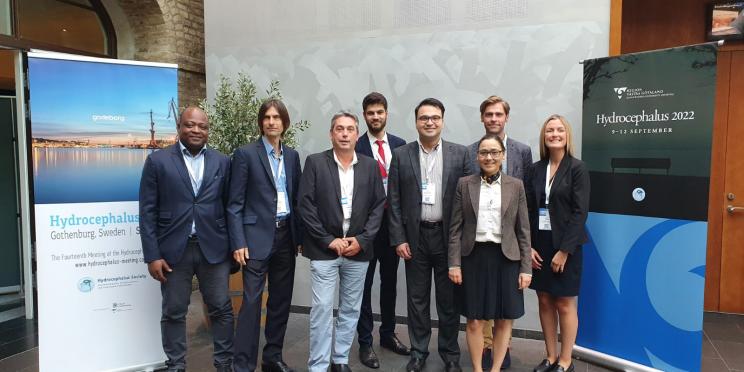REVERT - Project Closure Interview
22/01/2024

A question-and-answer session with Dr Peter Smielewski, Senior Research Associate and Mr Alexis Joannides, Consultant Neurosurgeon.
Tell us about your project
The Reversible Dementia project (REVERT) has transformed the management of patients with normal pressure hydrocephalus (NPH) through the application of novel diagnostics within a new model of care. NPH is a reversible form of dementia which can be treated effectively with a simple surgical procedure but remains significantly underdiagnosed.
REVERT has implemented an innovative care pathway, new diagnostic tools, and a digital portal across its partner institutions, leading to faster and more accurate diagnosis and treatment of NPH. These changes have ultimately resulted in better patient experience, reduced time to treatment, and improved quality of life for patients.
The project implementation has been shown to be cost-effective by creating value for money to acute healthcare services. This was achieved through a reduction in emergency admissions and length of stay, as well as reduction in social care costs as a result of improving patients ability to carry out everyday activities safely and independently.
What have been the key outputs and results for your project?
The three key outputs of REVERT are: (1) establishment of a multidisciplinary one-stop clinic incorporating a core dataset of cognitive and gait measures for efficient screening and triage of new referrals for NPH, with increased awareness of the condition across the healthcare sector and the general public, (2) improvement of novel diagnostic tests through the refinement of mathematical models for calculating brain pressure and flow, and development of clinical protocols for the adoption of these tests within the routine care pathway, and (3) implementation of a digital portal for integrating data across the clinical pathway and for linking with national registries and research databases.
Through a combination of fostering an innovation culture, actively involving patients, and collaborating with partners, REVERT has been able to deliver successful results and drive meaningful advancements in the treatment of NPH.
Can you tell us about the experiences, products/ services and how you plan (or have started) to commercialise / roll out more widely?
Our project experiences have been shaped by ongoing collaboration with multidisciplinary professionals and patients to ensure that our solutions remained patient-centred at all times.
To upscale our offerings, we have initiated various steps:
- The a web-based hydrocephalus management platform (known as the HyPPo platform) has been launched, and we will be looking at ways to further commercialise the platform throughout the UK and France.
- The multidisciplinary best-practice guidelines will be disseminated through the public-facing section of the HyPPo platform, and implementation outcomes will be presented to the wider scientific and clinical communities.
- The gait app, although still undergoing rigorous validation and adjustments, aims for subsequent commercialisation, potentially through in-depth integration into the HyPPo platform.
- The new mathematical models underpinning the diagnostic tests will be disseminated through scientific conferences and publications. Once validated with sufficient data, these models will be incorporated into the existing diagnostic software we have developed to improve its accuracy.

A study visit taking place at the University Hospital in Brest, Brittany
What lessons have you learned throughout the project?
We realised that implementing changes in clinical practice requires time, persistence, and problem-solving skills. Flexibility in our approach, and in particular listening to patient and professional feedback, was crucial to achieving our overall objectives.
The project also highlighted the challenges associated with cross-border collaboration in healthcare. Applying developed solutions in other healthcare systems was occasionally challenging due to differences in infrastructure, workplace practice, legislation, and administrative processes. However, the rewards of such collaboration were significant, as it allowed for the sharing of knowledge and expertise across borders.
Additionally, the project underscored the importance of building long-lasting relationships and partnerships, thus mitigating the effect of Brexit on our UK-EU collaboration.
Overall, the project taught us the importance of perseverance, flexibility, cross-border collaboration, multidisciplinary approaches to treatment, and the significance of fostering enduring partnerships in achieving our goals and improving patient care.
What do you hope is the legacy of the project?
We hope that the legacy of REVERT will have a lasting impact on healthcare and research. Firstly, the multidisciplinary service model implemented serves as a proof of concept for other centres to adopt in the UK and France.
The project has fostered strong partnerships that will continue to contribute to the scientific field of brain dynamics and its clinical application. Furthermore, the data and research infrastructure developed through REVERT will support further advancements in understanding and managing the disease. The HyPPo digital platform, developed as part of the project, acts as a comprehensive portal for managing NPH patients which we hope can be rolled out across other sites.
Overall, the legacy of the REVERT project lies in its contribution to enhanced clinical care, scientific progress, and widespread dissemination of knowledge, all of which aim to improve the lives of NPH patients across the Channel Manche region and beyond.
The recently completed REVERT project ran from October 2020 to June 2023 and had a total budget of €3.61m (€2.49m ERDF).Further information about the project as well as resources are available on the REVERT website here (opens in new window).
